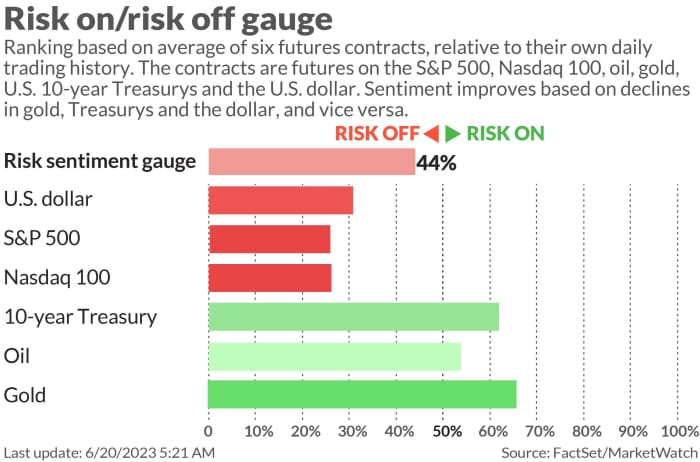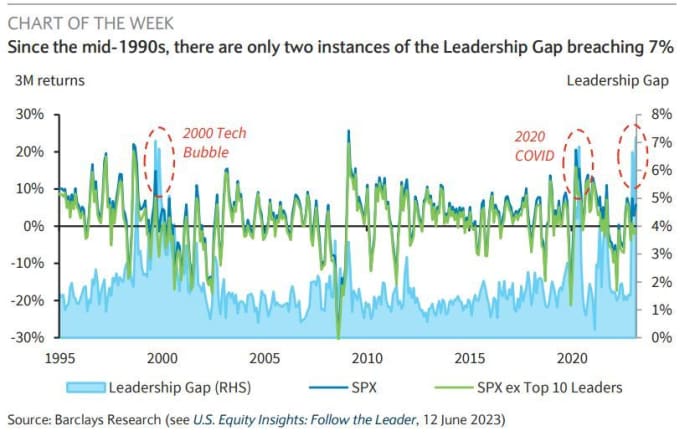This post was originally published on this site
Great market expectations for the Tuesday after a long holiday weekend in summer are destined for disappointment. Apart from the hazy, lazy effect, China rate moves that fell short of hopes aren’t helping the mood, as investors wait for Fed Chairman Jerome Powell to appear on Capitol Hill later this week.
The latest bearish remarks from Morgan Stanley’s Mike Wilson are in and he is doubling down on all his grimness. He sees a market flipping from fear to greed and says the increased participation of stocks in the S&P 500’s
SPX,
push higher isn’t enough to support the index at these levels.
One point Wilson makes is that investors are rushing into stocks just as fiscal support, helping to hold up consumer spending, fades. The bank’s rates strategists estimate that has amounted to $1 trillion in aid over the past 12 months — measures including the Inflation Reduction Act and those student-loan repayment moratorium.
That brings us to our call of the day from a team of Barclays analysts, led by Adrienne Yih who see about an impending $15.8 billion monthly hit to U.S. spending, as the average student loan holder faces a monthly payment of about $390 starting this fall.
“For most, this will be the first time making payments since the early days of the pandemic in March 2020. We regard the incremental ‘essential’ nature of the debt payments as likely to reduce discretionary spending by an approximately equal amount,” said Yih and the team.
In short, that will amount to a roughly 8% headwind to monthly personal income, hitting 16% of the U.S. population and adding pressure on consumer discretionary and apparel stocks, they say.
The Barclays analysts say their monthly estimate is on the conservative side, given it only takes into account federal student debt, which is 87.2% of total student debt.
As for the stocks, the analysts advise looking out for those with a consumer base that “skews toward higher income, higher education, and in the 18- to 34-year-old cohort.”
The greatest risk will hit the first bucket — recently graduated, newly employed individuals — who will likely be spending less at names like American Eagle Outfitters
AEO,
Urban Outfitters
URBN,
Figs
FIGS,
and Victoria’s Secret
VSCO,
In the second bucket, they see some risks to higher income, aspirational luxury retailers selling to that cohort, with stocks including Capri Holding
CPRI,
Tapestry
TPR,
Canada Goose
GOOS,
Nordstrom
JWN,
Lululemon
LULU,
and Ulta Beauty
ULTA,
all at risk.
The least risk is seen for those retailers with a customer base that targets lower income or lower educational levels, or are potentially older shoppers. Those stocks include National Vision
EYE,
Burlington Stores
BURL,
Ross Stores
ROST,
Old Navy at Gap
GPS,
and TJX
TJX,
The markets

Stock futures
ES00,
NQ00,
are tilting south and bond yields
TMUBMUSD10Y,
TMUBMUSD02Y,
are steady. Hong Kong stocks
HSI,
led Asia lower as China lending rate cuts disappointed some.
For more market updates plus actionable trade ideas for stocks, options and crypto, subscribe to MarketDiem by Investor’s Business Daily.
The buzz
China cut benchmark loan rates for the first time since August 2022. Goldman Sachs, which has downgraded China growth, noted some had expected bigger moves. China ADRs like Xpeng
XPEV,
and Nio
NIO,
are down 5% and 3%, respectively.
Alibaba
BABA,
1060,
has shaken up its leadership, with Daniel Zhang stepping down as chairman and chief executive, but staying on to lead the cloud business, which is expected to be spun off. The stock is down over 2%.
Dice Therapeutics stock
DICE,
is up 37% in premarket on news the biopharmaceutical will be acquired by Eli Lilly
LLY,
Cano Health stock
CANO,
is up 21% after the primary-care provider said its chief executive has agreed to step down.
FedEx
FDX,
results are due Tuesday and could indicate whether consumers are buying more stuff. La-Z-Boy
LZB,
will also report — both after the close.
Warren Buffett’s Berkshire Hathaway
BRK.A,
BRK.B,
has again boosted stakes in five Japanese trading companies — Mitsubishi
8058,
Mitsui
8031,
Itochu
8001,
Marubeni
8002,
and Sumitomo
8053,
— to more than 8.5% each
Novo Nordisk’s
NOVO.B,
NVO,
hit Wegovy weight-loss drug is set for sales of over $4 billion this year in the U.S. alone, says Citigroup.
Housing starts for May are due at 8:30 a.m., with New York President John Williams speaking at 11:45 a.m. The big spotlight this week will fall on Powell’s two-day testimony on Capitol Hill that starts Wednesday.
Best of the web
The bond market has already moved on from losing $17 billion on Credit Suisse securities.
Ships have been keeping Northern Hemisphere oceans cool with sulfur. That changed in 2020 (Twitter thread)
The chart
Another group of Barclays analysts, led by Venu Krishna looked at narrow leadership of the year-to-date S&P 500 rally via the so-called “leadership gap” —the spread between S&P 500 returns and returns without contribution of the top 10 stocks.
Over the last three decades, leadership has only been as narrow as it is today in 2000 and 2020, and both times, the top 10 stocks driving the rally retraced against the broader market in the short term, they note. That leadership gap has widened to more than 7%, and since the mid-1990s that has only happened in 2020 and 2020.

Read: This incredible chart shows the close relationship between the S&P 500 and Fed liquidity
The tickers
These were the top-searched tickers on MarketWatch as of 6 a.m.
| Ticker | Security name |
|
TSLA, |
Tesla |
|
GME, |
GameStop |
|
NVDA, |
Nvidia |
|
NIO, |
Nio |
|
MANU, |
Manchester United |
|
MULN, |
Mullen Automotive |
|
AAPL, |
Apple |
|
PLTR, |
Palantir |
|
SPCE, |
Virgin Galactic |
|
AMC, |
AMC Entertainment |
Random reads
New study shows three past Dutch rulers netted $596 million from slavery
Not the singers. The Thompson Twins are likely top NBA draft picks.
Need to Know starts early and is updated until the opening bell, but sign up here to get it delivered once to your email box. The emailed version will be sent out at about 7:30 a.m. Eastern.
Listen to the Best New Ideas in Money podcast with MarketWatch reporter Charles Passy and economist Stephanie Kelton.

